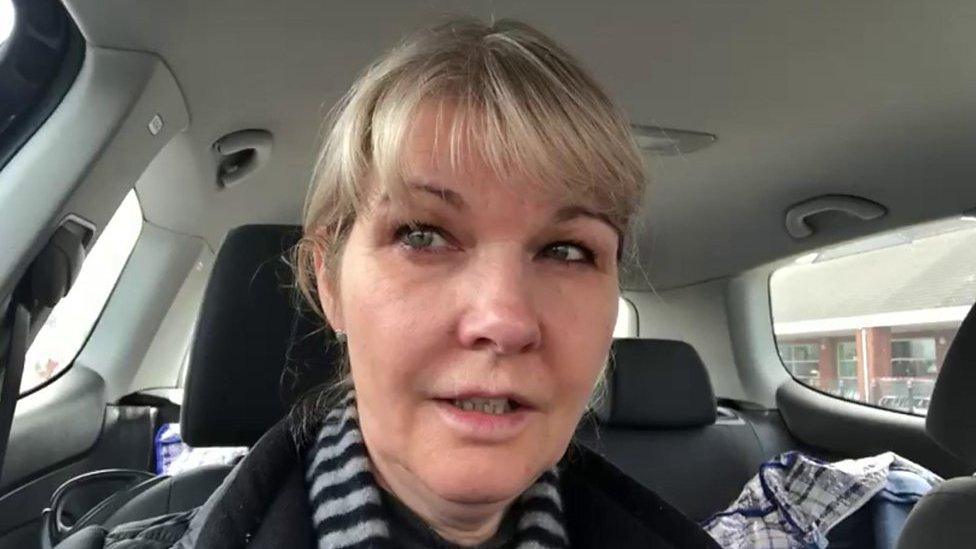Dawn Bilbrough: Food plea nurse considers quitting after Covid
- Published
Dawn Bilbrough: "Long-term I don't think I'll be in nursing"
A critical care nurse who tearfully urged the public to stop panic buying last year has said she is considering leaving her profession.
Dawn Bilbrough said the past year had been "relentless, incredibly traumatic and emotionally and physically exhausting".
Her video message in March 2020 went viral after she found supermarket shelves empty following a 48-hour week.
Ms Bilbrough told the BBC the "burden" of seeing patients die had been "hard".
The 52-year-old, from York, told BBC Radio 4's The World This Weekend that nothing in her 20-year nursing career could have prepared her for the last 12 months.
Speaking as the anniversary of her video approached, she said: "There have been times when I've come home and had a good cry, because we have witnessed so much… we're at the patient's bedside 12 hours a day and they haven't had that usual psychological support from their families.
"So we've been there… and got to know them as people, their likes and dislikes, their dreams; and then they've become really unwell and been placed on ventilators and quite often they haven't got through that.
"And that's been difficult because personally I've felt a bond to my patients, and to witness them not progress as we would wish, that's been really hard."
In the viral video, taken following a visit to a supermarket after she finished her working week, Ms Bilbrough pleaded with people to stop panic buying so she could purchase food.
"There's no fruit and veg, I had a little cry in there," she said.
Ms Bilbrough later went on to develop coronavirus symptoms.
She has now described seeing coronavirus patients die as a "burden" she has to bear. In normal times, she might lose a patient in intensive care once every two weeks, but during the pandemic several were dying every day.
In the last wave over winter, she said more died than survived.
"I was once working in a pod where there were four patients with Covid," she said.
"I left my shift at 20:00 in the evening. When I returned the next day all the patients had died, and were replaced with different people… although it's hard bearing this burden, you don't become desensitised - if you do, it's time to give up the profession."

Ms Bilbrough warned the pandemic was not over and that it was "shocking" that those on ventilators now are often in their 50s.
"What we have at the moment is an awful lot of patients that remain on ventilators that have been on them since January... we've got young people that are still needing that support. So it's quite shocking," she added.
Amid calls for a better pay rise for nurses, Ms Bilbrough said the public has "huge respect for the profession, and I do hope it will continue when people go back to their normal lives… I hope they remember the sacrifices and the burdens that people within the profession have made over the past year and will continue to make for a little while longer".
Ms Bilbrough said she has not dealt with the emotions of the most challenging year of her career because she has had to get on with her job.
She expressed her hope for support for the long-term stress, anxiety and depression those in her profession are experiencing.
"There's just this overwhelming sense of sadness that creeps in… and I think we have to kind of bury that because we're professionals and we can't explore that too deeply when we're at work," she said.
"So we're…carrying it around with us and for me, it's starting to come up a little bit and it needs to be addressed and processed, and it's going to take some time."
Listen to the full interview on BBC Radio 4's The World This Weekend at 13:00 on Sunday, and afterwards on BBC Sounds

HAVE A LAZY LOCKDOWN SUNDAY WITH US: Check out the great selection of films on BBC iPlayer
COVID CONFIDENTIAL: How did the government make key decisions during the pandemic?

Related topics
- Published26 March 2020
